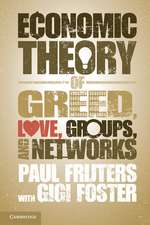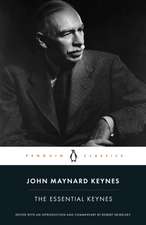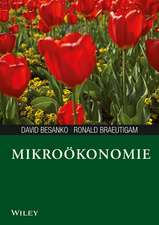Economic Analysis of Social Common Capital
Autor Hirofumi Uzawaen Limba Engleză Paperback – 19 oct 2008
| Toate formatele și edițiile | Preț | Express |
|---|---|---|
| Paperback (1) | 291.69 lei 43-57 zile | |
| Cambridge University Press – 19 oct 2008 | 291.69 lei 43-57 zile | |
| Hardback (1) | 782.83 lei 43-57 zile | |
| Cambridge University Press – 5 iun 2005 | 782.83 lei 43-57 zile |
Preț: 291.69 lei
Nou
Puncte Express: 438
Preț estimativ în valută:
55.81€ • 58.43$ • 46.18£
55.81€ • 58.43$ • 46.18£
Carte tipărită la comandă
Livrare economică 07-21 aprilie
Preluare comenzi: 021 569.72.76
Specificații
ISBN-13: 9780521066495
ISBN-10: 0521066492
Pagini: 416
Dimensiuni: 152 x 229 x 22 mm
Greutate: 0.54 kg
Ediția:1
Editura: Cambridge University Press
Colecția Cambridge University Press
Locul publicării:New York, United States
ISBN-10: 0521066492
Pagini: 416
Dimensiuni: 152 x 229 x 22 mm
Greutate: 0.54 kg
Ediția:1
Editura: Cambridge University Press
Colecția Cambridge University Press
Locul publicării:New York, United States
Cuprins
1. Fisheries, forestry, and agriculture in the theory of the commons; 2. The prototype model of social common capital; 3. Sustainability and social common capital; 4. A commons model of social common capital; 5. Energy and recycling of residual wastes; 6. Agriculture and social common capital; 7. Global warming and sustainable development; 8. Education as social common capital; 9. Medical care as social common capital.
Recenzii
'Uzawa has again contributed to the economic analysis of socially important problems. His treatment of social common capital shows the power of economic theory and is marked by Uzawa's customary clarity of exposition and mastery of analysis.' Kenneth Arrow, Nobel Laureate, Stanford University
'Professor Uzawa pioneered the economics of social common capital decades before it received the empirical attention it deserved. If theoretical explorations of the subject haven't received a contemporary airing, here it is. This is vintage Uzawa: deep, elegant, and highly relevant.' Sir Partha Dasgupta, University of Cambridge
'In this masterful volume, using the tools of mathematical economics, Hirofumi Uzawa shows how economic performance is critically tied to what he terms 'social common capital' – collective goods that must be provisioned through social and political mechanisms that lie beyond the market. The volume is an intriguing and accomplished piece of work by a highly distinguished scholar.' Richard Howarth, Dartmouth College
'No one but Hiro Uzawa could produce so precise, careful, and complete an analysis of the main forms of common property resources to be found in modern industrial society. Fortunately he has done it and provided about as much intellectual unity as seems appropriate. Filling in the worldly details will be worked on by many people for many years, but now there is a framework, indeed a common resource.' Robert Solow, Nobel Laureate, Massachusetts Institute of Technology
'Professor Uzawa pioneered the economics of social common capital decades before it received the empirical attention it deserved. If theoretical explorations of the subject haven't received a contemporary airing, here it is. This is vintage Uzawa: deep, elegant, and highly relevant.' Sir Partha Dasgupta, University of Cambridge
'In this masterful volume, using the tools of mathematical economics, Hirofumi Uzawa shows how economic performance is critically tied to what he terms 'social common capital' – collective goods that must be provisioned through social and political mechanisms that lie beyond the market. The volume is an intriguing and accomplished piece of work by a highly distinguished scholar.' Richard Howarth, Dartmouth College
'No one but Hiro Uzawa could produce so precise, careful, and complete an analysis of the main forms of common property resources to be found in modern industrial society. Fortunately he has done it and provided about as much intellectual unity as seems appropriate. Filling in the worldly details will be worked on by many people for many years, but now there is a framework, indeed a common resource.' Robert Solow, Nobel Laureate, Massachusetts Institute of Technology
Notă biografică
Descriere
This 2005 book analyzes how natural resources, social infrastructure, and institutions might be optimally sustained.













